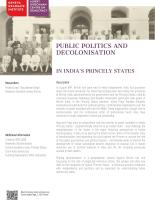In August 1947, British rule gave way to newly independent India. But questions about the future remained. For there had actually been two Indias: the provinces of British India, administered by the government; and the Princely States, ruled by nominally sovereign Maharajas and Nawabs. Nationalist politicians took power in British India. In the Princely States however, where Praja Mandals (People’s Associations) substituted for political parties, constitutional negotiations over the transfer of power extended well into the 1950s. These negotiations, though vital to decolonisation and the institutional order of postcolonial South Asia, have remained critically neglected in historical scholarship.
Unlike British India, where the colonial government handed charge to the nationalist leadership, the transition to independence and democracy unfolded in a dramatically different context and through a radically different process in the Princely States, which covered almost 40% of the pre-independence India – without accounting for which our understanding of decolonisation remains incomplete.
Raja and Praja aims to comprehend how the transfer of power unfolded in India’s Princely States – euphemistically referred to as ‘Indian India’ – and challenge the marginalisation of the States in the major historical perspectives in Indian historiography. It does so by placing the States at the centre of the broader story of decolonisation, and expanding its focus beyond the Princes to include the role of the public associations and political figures – and thereby seeks to discern the development of Indian nationalism beyond responses to colonial rule. It makes extensive use of archival material in India and the UK, including previously unused private papers.
Placing decolonisation in a geographical context beyond British rule and focussing on the role of neglected historical actors, this project will shed new light on the integration of India’s Princely States – a historical process congruent with independence and partition, and as important for understanding Indian democracy today.



